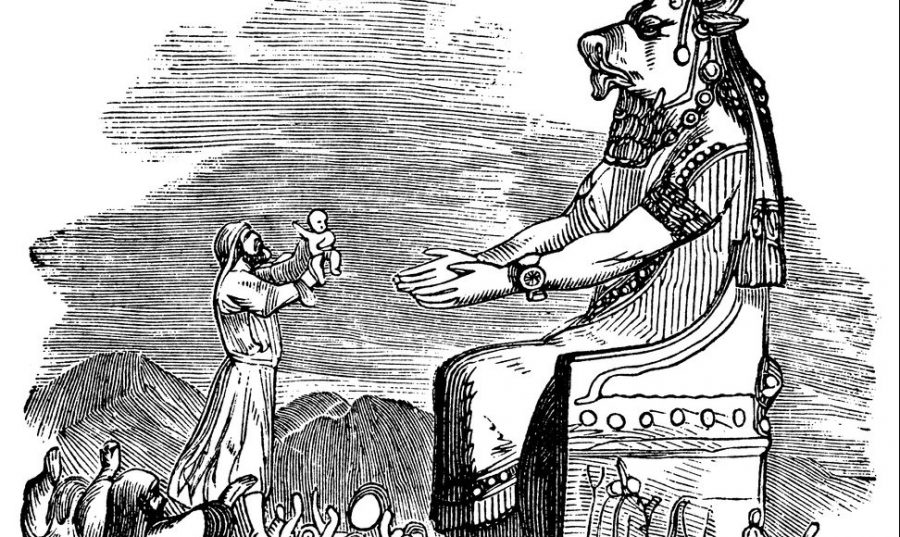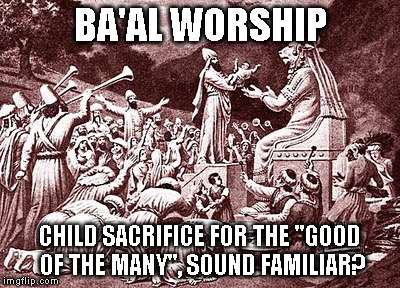The Worst Anti-Christian Argument Ever, and How to Answer It

Some anti-Christian objections are bad, some are awful, but one tops all the others: “Christians believe the Son of God died on the cross for our sins. That means Christians believe in child sacrifice!”
How is this wrong? Let me count the ways. One, it tramples on God’s most sacrificial act of love for us. Two, it’s dehumanizing, seeing Christians as either too stupid or too immoral to realize our religion is really about child abuse. Three, it shows how far willingly some people sacrifice their own rationality on the altar of their anti-Christian beliefs.
Shockingly, one of the more prominent persons arguing this way is a “progressive Christian” (“accommodationist” is a better term for it) named Brian Zahnd, who believes in Jesus’ death and resurrection but thinks the idea that He died for our forgiveness “portray[s] God as sharing the petty attributes of the primitive and pagan deities who can only be placated by the barbarism of child sacrifice.” He debated The Stream’s Michael Brown on it four years ago. (I’ll focus on answering atheists and skeptics here, while not forgetting that “progressive” accommodationism is often part of the path called “deconstruction,” today’s word for de-conversion and apostasy.)
If it weren’t so awful it would be laughable. Every thinking Christian knows this. How do you explain it, though, to the person who tries pulling it on you?
Approach

Familiar to Christians, you think? No, not even close.
Your first step — which is almost always the first step — is to ask and to listen. The right questions may reveal it’s less about their being irrational, more about basing their opinions “false facts.” Some people know nothing about Christianity but what they’ve heard on the atheist internet. They may think they’re objecting to what we believe, but they’re really arguing against their own distorted version of it. News flash: We don’t agree with distorted versions, either!
So if that’s what’s going on, that’s your opportunity to tell them the truth about Christ. The way you find out is by asking them questions. Greg Koukl’s outstanding book Tactics recommends two questions that work nearly everywhere: “What do you mean by that?” and “How did you come to that conclusion?” You won’t always say it those words, obviously. In this case you might say, “It sounds like you think Jesus’ death on the cross is a lot like child sacrifice, right? What is it that makes them the same, in your opinion?”
That’s a “What do you mean by that?” question. Listen, engage with what they say, be ready to ask them, “What led you to that conclusion?” Pray throughout every conversation like this, and listen for His guidance, too. And be ready with an answer of your own. Here are some things you can camp on.
The Crux of the Argument
The key is to recognize it’s an argument by analogy. It goes like this:
- Everyone knows child sacrifice is wrong.
- Jesus’ death on the cross is an act of child sacrifice.
- Therefore it’s just as wrong as any other child sacrifice.
Some readers are coughing and sputtering already. You know in your gut how bad the argument is. Let’s break it down anyway.
Analogies depend on things being the same, or close enough not to make any difference. So if point 2 is true and the cross is a lot like every other child sacrifice, the argument works. If point 2 is wrong, it falls apart. Skeptics think it works because Jesus is the Son of the Father, dying to appease a “primitive and barbaric” deity.
There’s just one problem with that: It’s wrong. Two problems, actually: It’s factually wrong and it’s morally wrong. So when they’re done explaining how they think they’re the same, ask them, “May I point out some big differences you’re overlooking here?”
If they say yes, great. If not, you might be be about to try giving a rational answer to an irrational challenge from a person who isn’t interested in hearing — not the best policy. Don’t give up without prayer and patience, though. Don’t shut the door to future conversations. If they’ll listen you can explain how they’ve missed it, both factually and morally.
Factually Wrong
Factually, child sacrifice always involves a child. Jesus was 33 years old. That alone is enough to kill the analogy, but there’s more. God the Son had a lot more than 33 years behind Him. The Gospel of John starts out telling us He was the One through whom the world was created by which we count the years. He was no child.
Child sacrifice also means killing someone who’s not old enough to understand, can’t give what we might call “informed consent,” and didn’t chose to die. None of that is true of Jesus.
Please Support The Stream: Equipping Christians to Think Clearly About the Political, Economic, and Moral Issues of Our Day.
Atheists may say, “You can’t get out of this by pulling that stuff from the Bible. It’s biased. No one believes it but Christians!” You need not go off course explaining or defending the Scriptures or Jesus’ deity. Save that for another day. Just let them know that if they’re objecting to what Christians believe, this is part of what we believe. It’s also crucial to our own understanding of the cross.
Morally Mixed Up
The analogy fails morally, too. There are reasons child sacrifice is wrong, and none of them match Jesus’ story.
One of the many reasons child sacrifice is evil is because it flips the parent/child relationship horrifically upside-down. Parents who should nurture and protect their children turn children into their protectors instead. The child becomes the one guarding them and their people from some vindictive god. Worse yet, it happens by the parents’ removing all protection from the child, letting him or her be killed.
That’s as wrong as wrong could be. It’s exactly the opposite of what happened when Christ died for us. Did the Second Person of the Trinity need a parent guarding over Him like a child? Was He killed to keep the Father safe — particularly to keep Him safe from some god? What could be worse thinking than that?
Jesus’ death wasn’t to fulfill anyone’s need but ours.
Skeptics might say Jesus was killed to fulfill some need of the Father. No. God has wants, but He doesn’t have needs like that. He what’s best for us, which includes our living in a faith-filled, loving relationship with Him. He doesn’t need, though. He’s not some spurned lover moaning, “I can’t live without your love!”
God is fine on His own. There’s room for plenty of love among the three Persons of the Trinity. So He doesn’t need us, but we certainly do need Him. Jesus’ death wasn’t to fulfill anyone’s need but ours.
Irrational, Ignorant, Dehumanizing
So this is nothing like every false religion’s child sacrifice. There’s no way to find any analogy there. There’s no way to think there is but by irrationality or by not knowing what Christianity teaches. If it’s not a problem in their reasoning, then it’s their spouting nonsense in total ignorance.
It isn’t just any everyday ordinary nonsense, though. It’s hateful, dehumanizing nonsense. It treats Christians as if we approve of child sacrifice — that’s one serious mark against us. Then it says we’re so obtuse, we don’t even know we approve of it. Immensely stupid, totally ignorant: If it were true, it would put us at the bottom of all humanity. (Brian Zahnd’s progressivism makes this same mistake, by the way.)
Watch out for that. If they think we’re that bad, it could easily open the door for them to justify treating us that badly.
Respond in Love and Truth Regardless
Nevertheless, the same cross we’ve been talking about tells us God loved us “when we were enemies.” He “demonstrates His own love for us in that while we were still sinners, Christ died for us.” (see Rom. 5:6-10)
So answer with love. Be patient. Keep your joy alive. Smile. Do not waver in the truth, but offer them the chance hear it if they’ll listen. Tell them the true story of Jesus. Do not be intimidated by their irrationality. Keep following Jesus, no matter what.
Tom Gilson (@TomGilsonAuthor) is a senior editor with The Stream and the author or editor of six books, including the highly acclaimed Too Good To Be False: How Jesus’ Incomparable Character Reveals His Reality.







